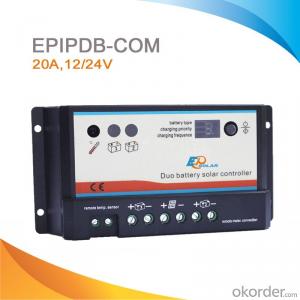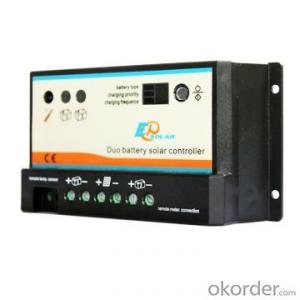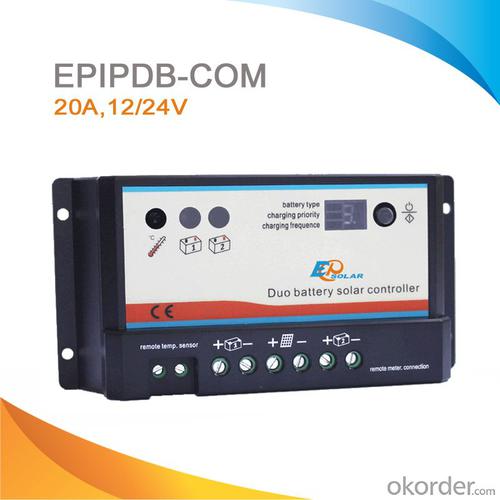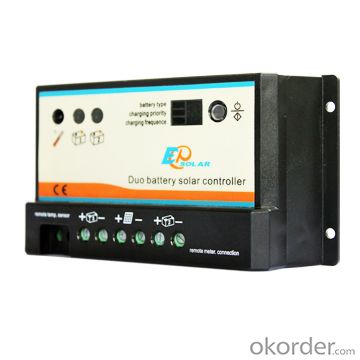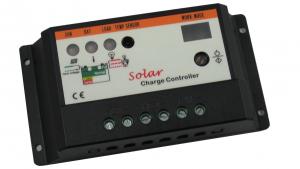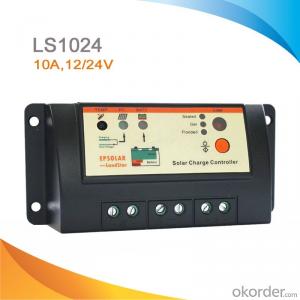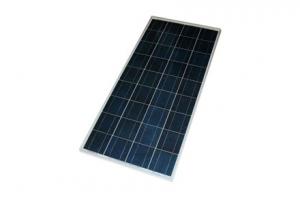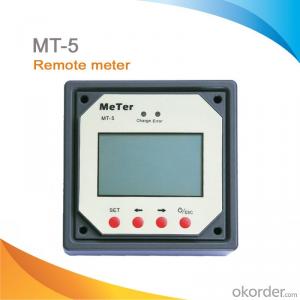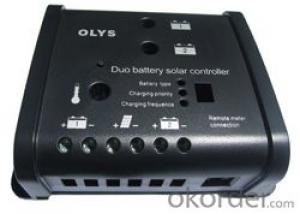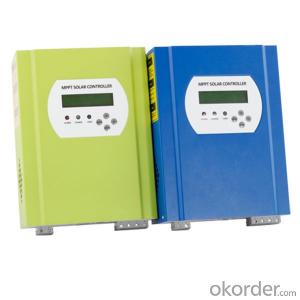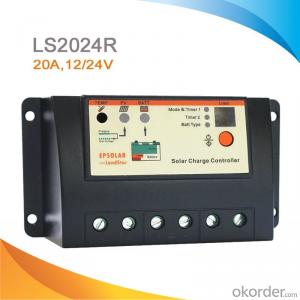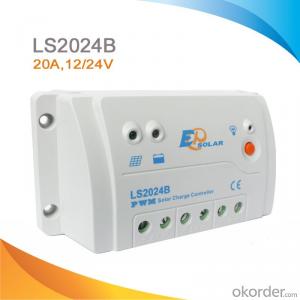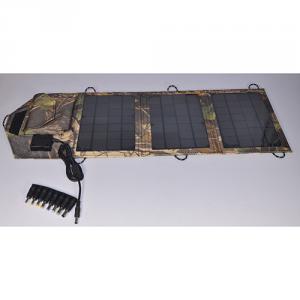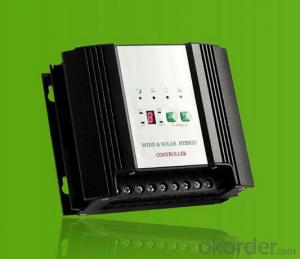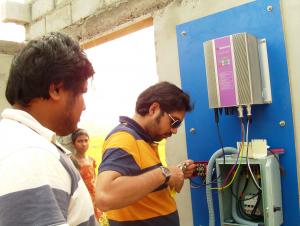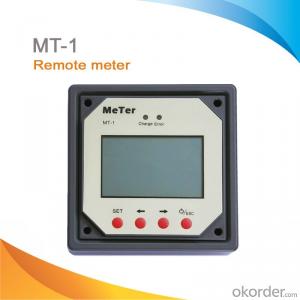Solar Controllers for Sale - Duo Battery Charge Controller Solar for Caravan, Motorhome, Boat and Golf Cart, 20A, 12/24V, EPIPDB-COM
- Loading Port:
- Tianjin
- Payment Terms:
- TT or LC
- Min Order Qty:
- 30 pc
- Supply Capability:
- 1000 pc/month
OKorder Service Pledge
OKorder Financial Service
You Might Also Like
EPIPDB-COM series solar controller can charge two battery banks. No load terminals
Features:
·Two battery charging eliminates the extra cost of two separate solar charging system
·Intelligent System Optimum Control
·12/24V auto work
·Battery type selection
·Charging frequency optional
·High efficient Series PWM charging
·Local external temperature compensation
·Remote temperature sensor optional
·Use MOSFET as electronic switch, without any mechanical switch
·Remote meter MT-1 optional
·Electronic protection: over charging, short circuit, battery reverse polarity protection
Specification:
Electrical parameters | |
System voltage | 12 / 24VDC Auto work |
Nominal battery current | 10A,20A |
Charge circuit voltage drop | ≤0.26V |
Discharge circuit voltage drop | ≤0.15V |
Self consumption | ≤6mA |
Working temperature | -35℃ to +55℃ |
Humidity | 10%-90% NC |
Enclosure | IP30 |
Terminal | 4mm2 |
Net weight | 0.24kg |
Battery voltage parameters (temperature at 25°C) | |||
Battery charging setting | Sealed | Flooded | Gel |
Equalize charging voltage | 14.4 V;x2/24V | 14.6V;x2/24V | 14.8V;x2/24V |
Boost charging voltage | 14.2V;x2/24V | 14.4V;x2/24V | 14.6V;x2/24V |
Float charging voltage | 13.7V;x2/24V | 13.7V;x2/24V | 13.7V;x2/24V |
Max. solar voltage | 30V(12V system),55V(24V system) | ||
Battery voltage range | 8-15V(12V system),8-30V(24V system) | ||
Self-consumption | 4mA at night, 10mA at charging | ||
Meterbus connection | 8-pin RJ-45 | ||
Temp. compensation | -5mv/℃/2V | ||
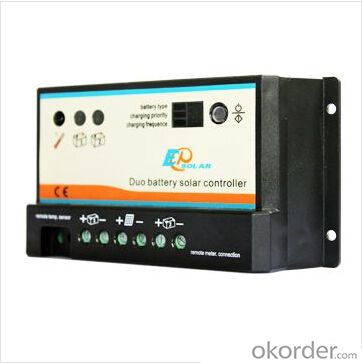
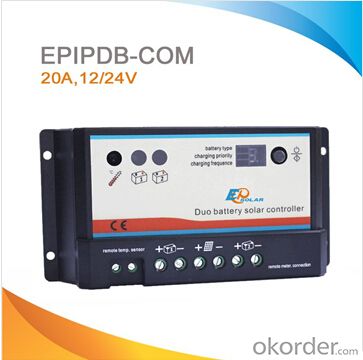
FAQ:
Q1. What is the voltage?
A1. Our 45/60A solar charge controller is 12/24/36/48V auto work.
Q2. What is the difference between MPPT&PWM?
A2. MPPT has higher efficiency, it can track the max power point and won't waste energy.
Q3. What is the efficiency of the MPPT controller?
A3. MPPT>99%, peak conversion efficiency>98%.
Q4. What is the waranty of product?
A4. 12 months.
- Q: What is the role of a battery equalization function in a solar controller?
- The role of a battery equalization function in a solar controller is to balance the charge levels of individual battery cells or groups of cells within a battery bank. This function ensures that each cell or group is charged and discharged evenly, preventing any imbalances that can lead to reduced battery performance or premature failure. By equalizing the charge levels, the battery's overall capacity and lifespan are optimized, resulting in more efficient and reliable energy storage for the solar system.
- Q: Do solar controllers require regular maintenance?
- Regular maintenance is required for solar controllers. Although they are built to be durable and reliable, it is necessary to perform regular maintenance to ensure optimal performance and longevity. Some common maintenance tasks include cleaning the solar panels to remove dirt or debris that could reduce efficiency, inspecting the wiring and connections for damage or corrosion, and checking the controller's display and settings to ensure proper functioning. It is also recommended to periodically test the system's battery voltage and charge controller settings to ensure they are operating within desired parameters. Regular maintenance not only helps identify potential issues early on but also maximizes the efficiency and lifespan of the solar controller.
- Q: How do you prevent reverse current flow with a solar controller?
- A solar controller prevents reverse current flow by using diodes that only allow current to flow in one direction, from the solar panels to the battery. This ensures that any excess electricity generated by the panels does not flow back into the panels or damage the system.
- Q: Can a solar controller be used for off-grid solar systems?
- Yes, a solar controller can be used for off-grid solar systems. The controller regulates the flow of electricity from the solar panels to the batteries, ensuring efficient charging and preventing overcharging. It is an essential component for off-grid systems as it helps manage and optimize the use of solar energy.
- Q: Can a solar controller be used with lead-acid batteries?
- Yes, a solar controller can be used with lead-acid batteries. In fact, it is a common practice to use a solar controller to regulate the charging and discharging of lead-acid batteries in solar power systems. The solar controller helps to prevent overcharging and over-discharging, ensuring the longevity and optimal performance of the batteries.
- Q: Can a solar controller be used with a solar-powered agricultural research facility?
- Yes, a solar controller can be used with a solar-powered agricultural research facility. A solar controller helps regulate the flow of electricity from the solar panels to the battery storage system, ensuring optimal charging and preventing overcharging or discharging. It is essential for maintaining the efficiency and longevity of the solar power system in an agricultural research facility.
- Q: What is the voltage range for a solar controller?
- The voltage range for a solar controller typically varies between 12V and 48V, depending on the specific model and application.
- Q: Can a solar controller be used with different types of solar panel grounding systems?
- Yes, a solar controller can be used with different types of solar panel grounding systems. The solar controller is responsible for regulating the charge coming from the solar panels and managing the flow of electricity to the batteries or grid. It does not depend on the grounding system of the solar panels, which is mainly for safety purposes. However, it is important to ensure that the solar controller is compatible with the type of solar panel grounding system being used to ensure proper functionality and safety.
- Q: Can a solar controller be used for battery charging in remote locations?
- Yes, a solar controller can be used for battery charging in remote locations. Solar controllers regulate the voltage and current from solar panels to ensure efficient charging of batteries. They are designed to work in off-grid and remote locations by managing the flow of power from solar panels to batteries, preventing overcharging and protecting the batteries from damage.
- Q: What are the advantages and disadvantages of an MPPT solar controller?
- Advantages of an MPPT (Maximum Power Point Tracking) solar controller include increased efficiency in converting solar energy into electrical power, which results in higher energy yields. MPPT controllers can also handle higher voltage solar modules, allowing for longer cable runs and reduced voltage drop. Additionally, MPPT controllers offer better adaptability to changing weather conditions and varying solar panel orientations. However, there are a few disadvantages to consider. MPPT solar controllers can be more expensive compared to traditional PWM (Pulse Width Modulation) controllers. They may also require additional components such as DC-DC converters, which can increase system complexity and cost. MPPT controllers are also more susceptible to damage from overvoltage conditions, and their efficiency can be affected by extreme temperature variations. Despite these drawbacks, the advantages of an MPPT solar controller, such as increased energy production and flexibility, make it a popular choice for maximizing the solar power output in various applications.
Send your message to us
Solar Controllers for Sale - Duo Battery Charge Controller Solar for Caravan, Motorhome, Boat and Golf Cart, 20A, 12/24V, EPIPDB-COM
- Loading Port:
- Tianjin
- Payment Terms:
- TT or LC
- Min Order Qty:
- 30 pc
- Supply Capability:
- 1000 pc/month
OKorder Service Pledge
OKorder Financial Service
Similar products
Hot products
Hot Searches
Related keywords
